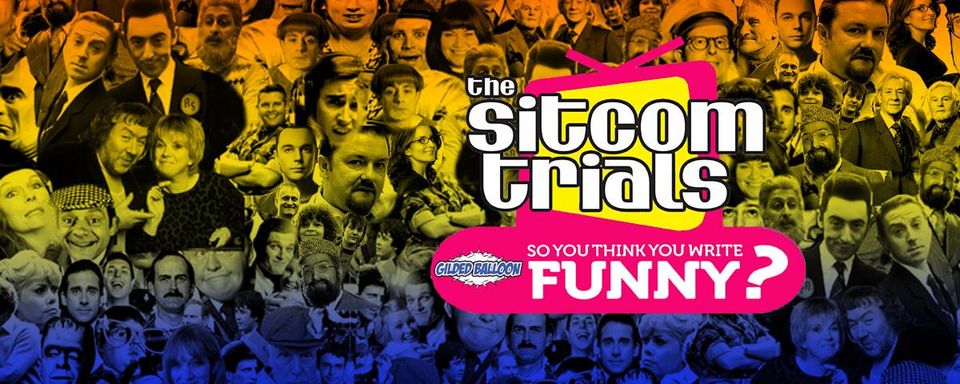Hello. My name is Sean and I'm behind the
Manchester heat of The Sitcom Trials. I know the submission deadline is looming
and some of you may have already submitted stuff. I meant to do this sooner but
I've been busy trying to clear my to do list in prep to read all of your
scripts.
I want to talk a little bit about what I
think makes a good script entry and, perhaps controversially, the answer isn't
jokes*.
MIDDLE.
STORY
Let's start with a little narrative theory
that pretty much all sitcom falls into. Sorry if this is teaching a fish how to
swim for some of you. Todorov's theory of equilibrium is thus:
1. Equilibrium. Our hero is going about
their day.
2. Disequilibrium. Something happens to
affect their day. This can be your inciting incident (the thing that gets your
story moving).
3. Our hero tries to restore order.
(There can be multiple attempts – in sitcom these often make the situation
worse).
4. A new equilibrium is established
(though in sitcom it is often a return to the old equilibrium – Fletcher is
still in prison, Ted is still on Craggy Island etc.)
Beginning. Middle. End. This sounds like
common sense but you'll be surprised how often people forget this stuff.
Disequilibrium doesn't have to be a major
event. It could be a little thing like running out of tea bags, getting a flat
tyre or forgetting a birthday. The same goes for your cliffhanger.
This is how too many scripts I have read
tend to go: Banter. Banter. Banter. Banter. Banter. The Inspector is here!
Cliffhanger. Hurried resolution (often skipping out the resolution of the
problem and going straight to what happened after).
The inspector arriving towards the end
isn't as interesting as the inspector arriving in the first scene and being the
ex wife of our lead character and them being forced together. We want to be
able to see the resolution happening too.
Whatever your cliffhanger is, maybe you
should make that your inciting incident. A story isn't about what happens,
it's about how your characters deal with what is happening. That is the
driving force of any comedy.
You don't have much time. Don't waste it
with extraneous set up. A great example of expedient writing is Episode 2 of
Father Ted: “Entertaining Father Stone” - the inciting incident has already
happened – we're not dreading the arrival of Father Stone, he's already
there.
Just because we're doing this on stage with
zero budget doesn't mean you can't have scene changes. Try and keep your
locations to a minimum but too often scripts read like over long sketches or
one long meandering scene. I say you don't have a lot of time but you'll be
surprised what you can fit into your script – the average TV sitcom episode is
maybe about 25 minutes long and they often pack loads in. Cut anything
extraneous and give yourself more time for action and gags. Enter a scene late.
Leave early.
Kill your babies unless they absolutely
deserve to be there. This will only set you free as a writer.
CHARACTERS
This is what most people remember about a
sitcom. Not it's jokes – unless they are exceptional. They remember Captain
Mainwaring's red faced pomp, they remember Hyacinth Bucket's phone manner, they
remember Edina Monsoon's terrible fashion sense and desperation to be on top of
new trends. How a character deals with situations is the key to any story.
The humour stems from your characters.
Example: Father Dougal not remembering having met Sister Assumpta until they
mention the jumper he was wearing.
People sitting around delivering constant
witticisms, being snarky or just bantering constantly is dull. It's deathly
bloody dull. If I don't care about anyone in the script I don't care about what
they have to say. People sitting around being “funny” and nothing happening is
boring. The Royal Family was people sitting around yes, but loads happened and
they had interesting things to say. Sarcasm and jokes = not the same thing.
What do your characters want? What stops
them? How can/do they over come it? Every character, every scene and every
story is driven by a want, both external and internal.
Example:
External want: Lee wants to stop a
mugger from stealing a handbag.
Internal want: Lee wants to save face in
front of Lucy.
Both of these wants drive your dialogue,
your story and are where the comedy stems from.
Think about archetypes – different to
stereotypes – and how your characters fit together. Examples: The bossy one.
The loveable loser. The sensible one. The slightly mad one. The horny one. What
happens when the loveable loser fails to attract the sensible one because the
horny one had wrangled their hands down his pants?
How do your characters fit into their
situation? How do they react to each other and the problems they are faced
with? What drives them? Who is our hero and who is the character that we
associate with. Arguably, David Brent is the “hero” of The Office but Tim is
the character that the audience latches onto.
I, as a reader, actor and director need to
get your characters straight away. We, as an audience, need to get your
characters straight away.
END.
Write interesting characters. Write
stories with action**. The jokes will come last.
*To qualify, by jokes I mean “gags” that
have nothing to do with the story or characters.
**stuff happening, not car chases.
POST
CREDITS GAG.
If you want to look at other advice written
by people far more qualified than I then check out these links:




